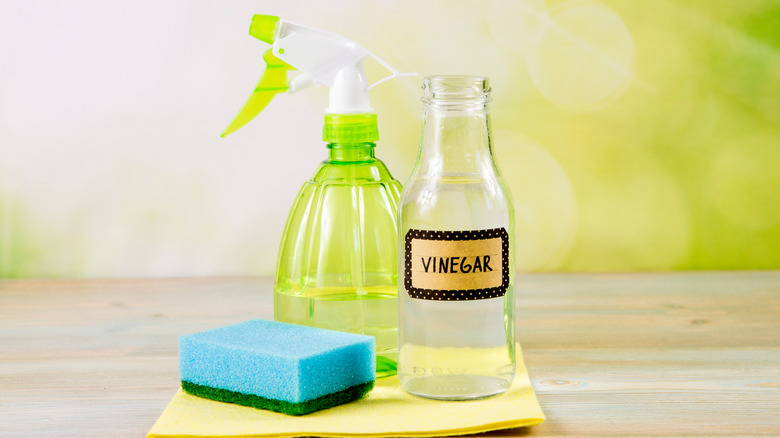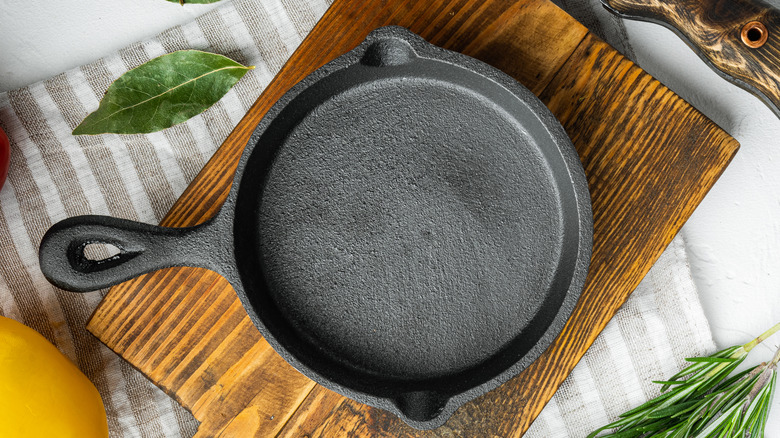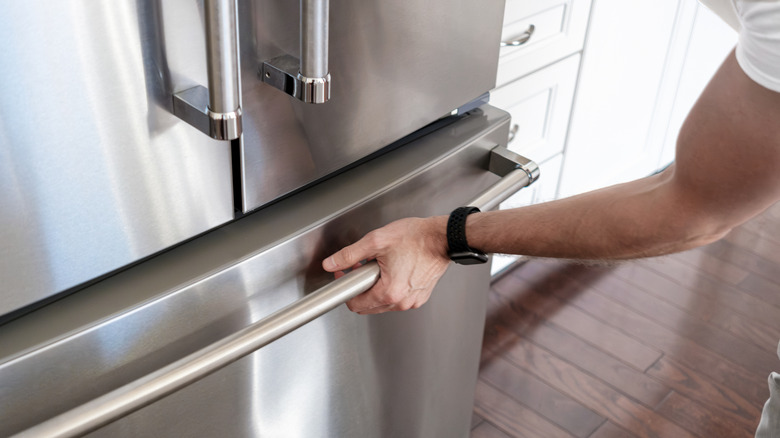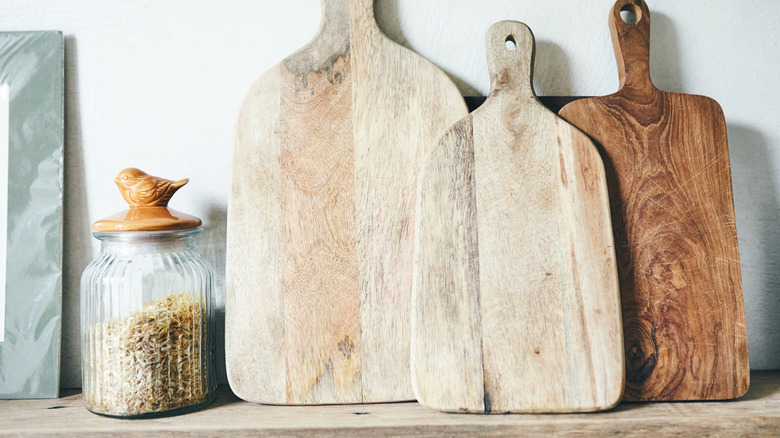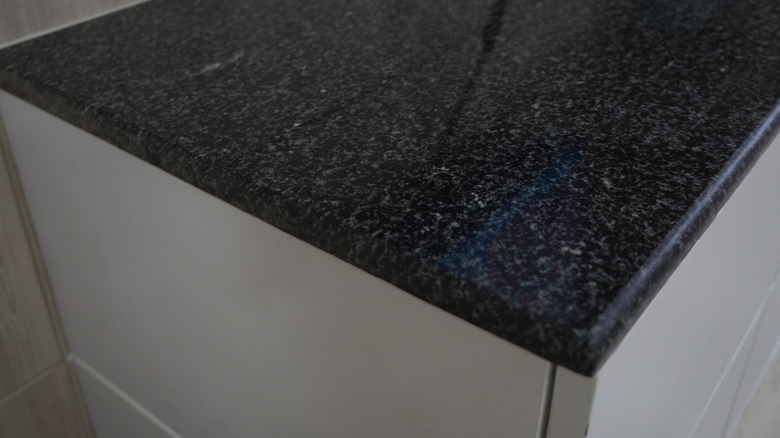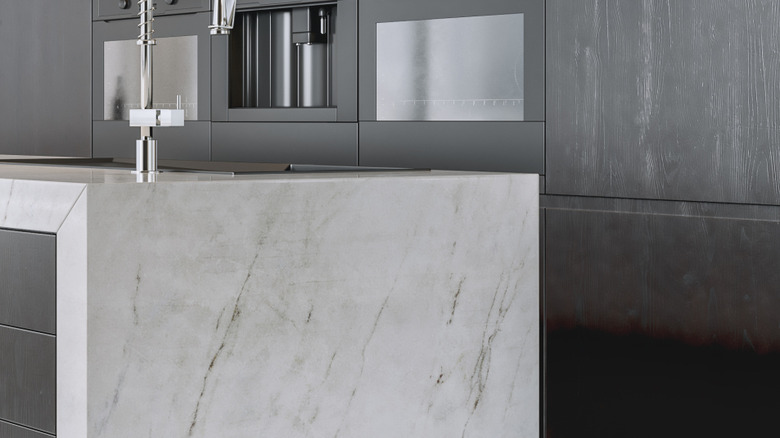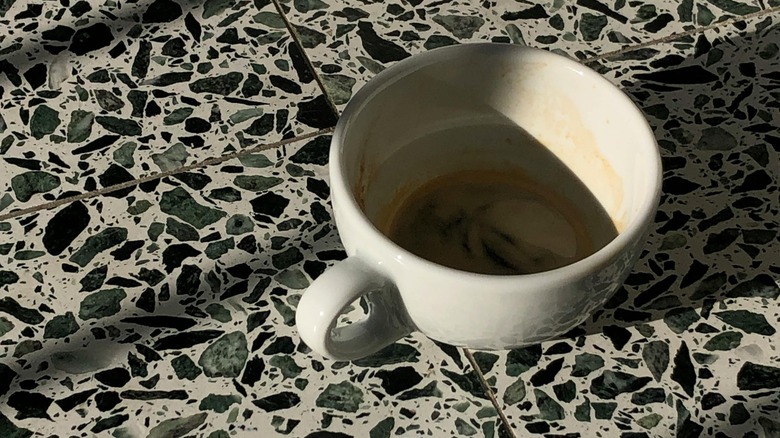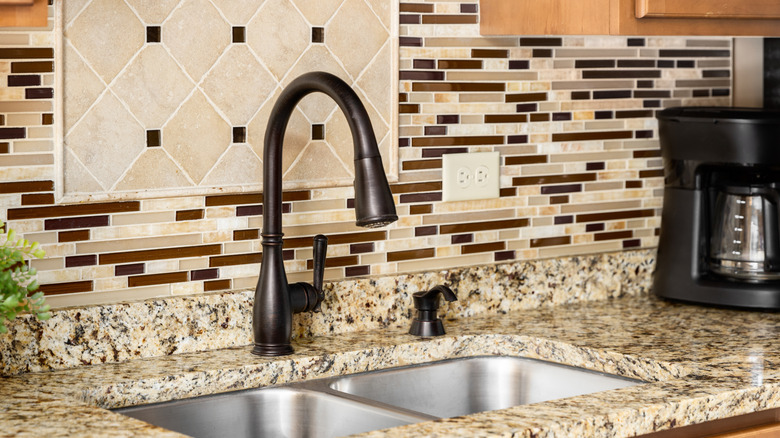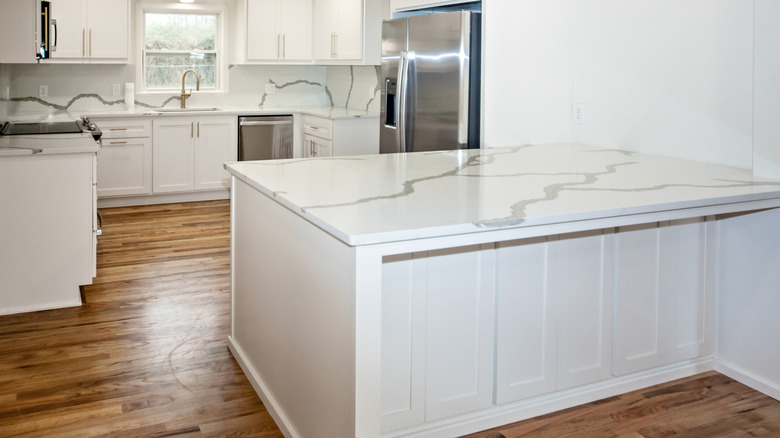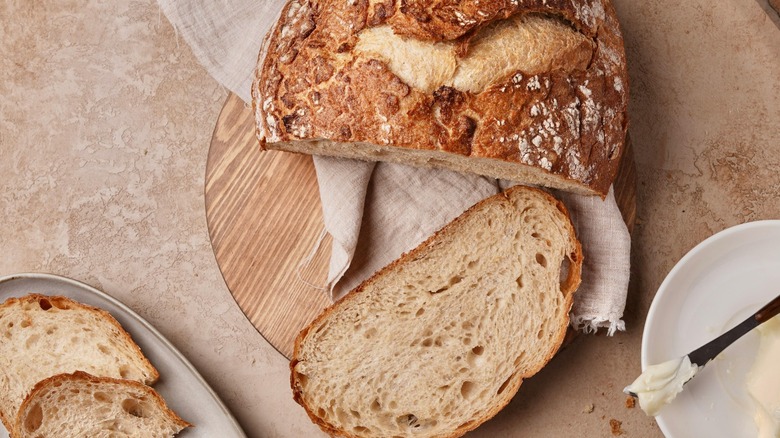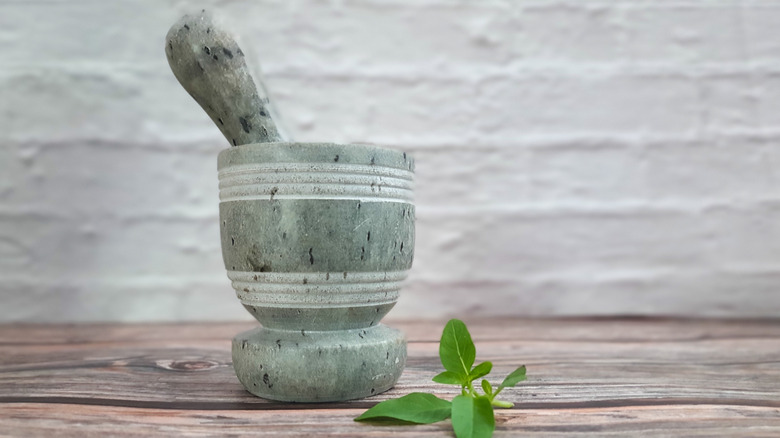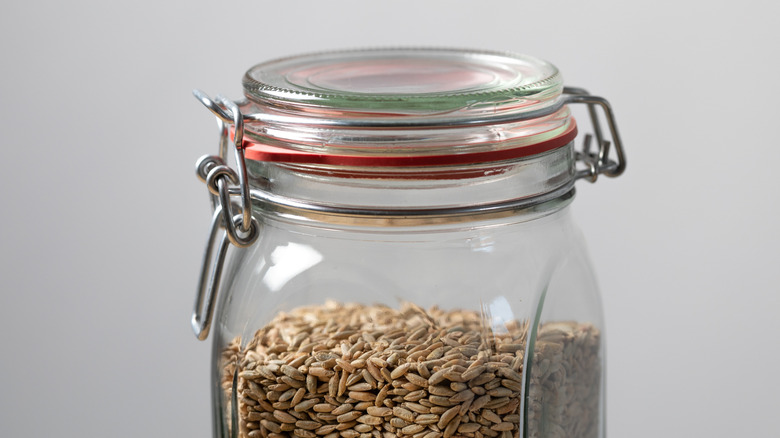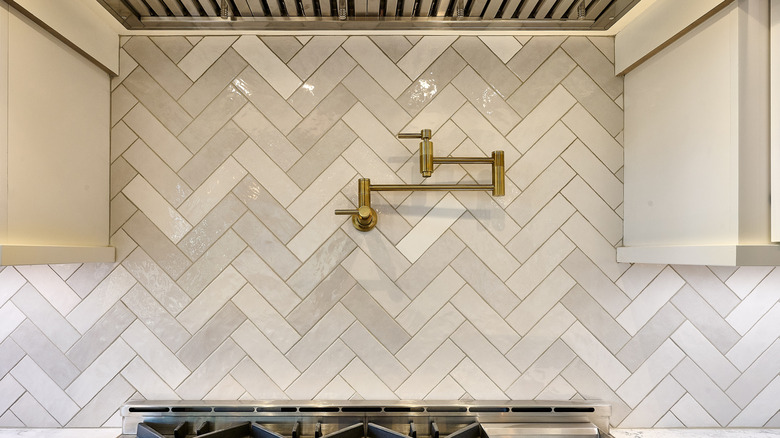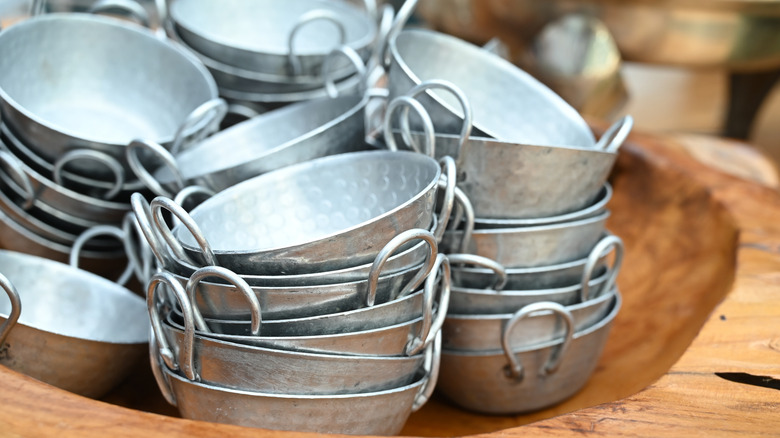13 Common Kitchen Materials You Should Never Clean With Vinegar
If you are looking to keep your kitchen spic and span, you have likely stumbled upon a variety of cleaning hacks ranging from make-your-own-all-purpose-cleaner recipes, to product recommendations for the best cleaners on the market. While you can find suitable products to keep your kitchen fresh and clean, the significant variety of materials present in your kitchen makes it difficult to find a "one-size-fits-all" solution. Vinegar has long been touted as an all-purpose cleaning solution that can deliver miraculous results to nearly any surface in your home. However, there are some downsides to cleaning with vinegar. While it may be great for some cleaning tasks, it is certainly not an innocuous substance when it comes to certain materials in your kitchen.
Truth be told, there are a number of kitchen materials that you should never use vinegar to clean. This ranges from materials like cast-iron and aluminum, which you may use to cook and prepare food, to the natural stone that may be present on your kitchen's flooring, countertops, or backsplashes. Opting to use vinegar on any of these kitchen materials can spell disaster for the appearance and integrity of the items. So before you grab your jug of white vinegar, take a moment to ensure that your kitchen materials won't be harmed by this common acidic liquid.
Cast iron skillets
A cast iron skillet is an irreplaceable kitchen tool for creating all sorts of delicious meals. If you own one, you likely know how important it is to care for your cast iron skillet. In addition to keeping your cast iron skillet well-seasoned and dry, it's imperative that you don't expose it to vinegar. The acidic nature of this popular cleaner can strip away the protective coating of the skillet, causing irreparable harm.
Stainless steel
Stainless steel is a highly common kitchen material; from appliances to bowls and knives, it is likely found in multiple places in your culinary corner. While you might think it is a good idea to use vinegar on stainless steel for a spot-free shine, doing so can cause issues like pitting. Though harmless to a piece's performance, pitting will leave areas marked with discoloration. Instead of cleaning with vinegar, read up on the best way to clean stainless steel appliances to keep them shining like new, and only use cleaners labeled as safe for use on stainless steel.
Unfinished wood
Unfinished wood may be found in a number of kitchen accessories and tools — like that rustic cutting board you got on your last trip to Europe. Unfinished wood lacks any protective finish and is extra susceptible to damage from the elements and environmental factors like dust. Therefore, keeping unfinished wood clean is an important part of maintaining its natural beauty. Despite being an all-natural cleaning option, vinegar can harm the appearance and integrity of unfinished wood, since it can seep into the fibers.
Granite
Granite is a durable stone that is timeless and luxurious. Since it is so resilient in the face of hard wear and tear like heat, scratches, and stains, it is a popular material for kitchen countertops. If you have been fortunate enough to find a home with granite countertops, you'll want to protect them with the right cleaning practices. As such, vinegar is to be avoided. Despite its strength, granite can be harmed by the acidic nature of vinegar, which can cause weakening and etching over time.
Marble
Not quite as strong as granite but arguably just as beautiful (if not more so), marble is a popular kitchen material. Its light color makes it very versatile in a number of decor schemes, elevating the luxury of your home and kitchen significantly. That being said, it must be cared for correctly if you're hoping to get the most out of it. Vinegar is an enemy of marble's natural beauty and shine, leaving a dull, chalky appearance.
Terrazzo
When it comes to kitchen flooring, there are fewer iconic options than terrazzo. This speckled flooring is incredibly hard and has a timeless but casual classiness to it, which are just some of the many advantages of installing this flooring. If you're looking to get the most out of your terrazzo kitchen floors, you'll need to approach its care and cleaning correctly. Vinegar can harm the appearance of your terrazzo floors by causing the surface to become dull, rather than its naturally shiny finish. In addition to a dull appearance, the vinegar can cause etching on the surface.
Oil-rubbed bronze
Oil-rubbed bronze is a popular finish for kitchen fixtures like faucets and drawer pulls. Its beautiful, aged appearance makes it look like something you'd encounter at a historic manor, but it requires some special care. While vinegar can be helpful when it comes to removing hard water stains that might be visible on the dark bronzed fixtures, applying straight vinegar can wear away at the oil-rubbed finish. Instead, you'll want to opt for a vinegar and water mixture, each in equal parts.
Quartz
Quartz is another popular kitchen material, and is made by combining resin and quartz crystals to create countertops. It is non-porous and strong, making it a wonderful and durable option for busy kitchens, but acidic cleaners like vinegar can dramatically harm it. If you apply vinegar to a quartz countertop you may be left with portions that are discolored, so always opt for cleaners that are specially formulated for use with this material.
Travertine
Travertine is a truly beautiful option when it comes to flooring, countertops, or backsplashes. Like most specialty materials, travertine requires appropriate care if it is going to last for a lifetime. Vinegar is a big no-no for cleaning travertine; similarly to granite and marble, the acidic properties of vinegar will cause the stone to be discolored. Instead, you'll need to find a cleaner that is neutral to keep travertine looking its best.
Soapstone
Soapstone is a lovely natural stone that adds an ancient and earthy feel to your kitchen. You may be used to seeing it for small kitchen accessories like a mortar and pestle or a small charcuterie serving board, but if you want to keep it looking as good as the first day you bought it, you'll need to avoid exposing it to acids like vinegar. Instead, nourish it with mineral oil and clean it with specially-made products meant for soapstones.
Rubber seals
Rubber seals might not instantly come to mind when you think of kitchen materials, but these unsung heroes are vital when it comes to keeping your airtight containers airtight, and preventing your appliances from leaking cold air or liquid onto the ground. Unfortunately, while vinegar is great at cleaning some grimy messes, its acid can result in your rubber being deteriorated over time. Play it safe and choose something else to wipe or wash your rubber parts in the kitchen.
Unsealed grout
Grout is a necessary component in your kitchen to help keep tiles together and fill the space in between gaps. While it is important to keep your grout clean and free from mold and mildew, vinegar is not a suitable cleaner if your grout is unsealed or damaged. Cleaning unsealed grout with vinegar can wear it down and compromise its integrity. However, if your grout is sealed and in-tact, cleaning with vinegar won't cause harm.
Aluminum
Aluminum is a very common material for kitchen tools, such as mixing bowls. It's generally easy to care for, but can be damaged if you use the wrong method. Vinegar, namely, is not a good choice for cleaning your aluminum, since its acid can harm the surface of the metal. If you are determined to use vinegar to clean your aluminum, it needs to be diluted and tested on a small portion first.
